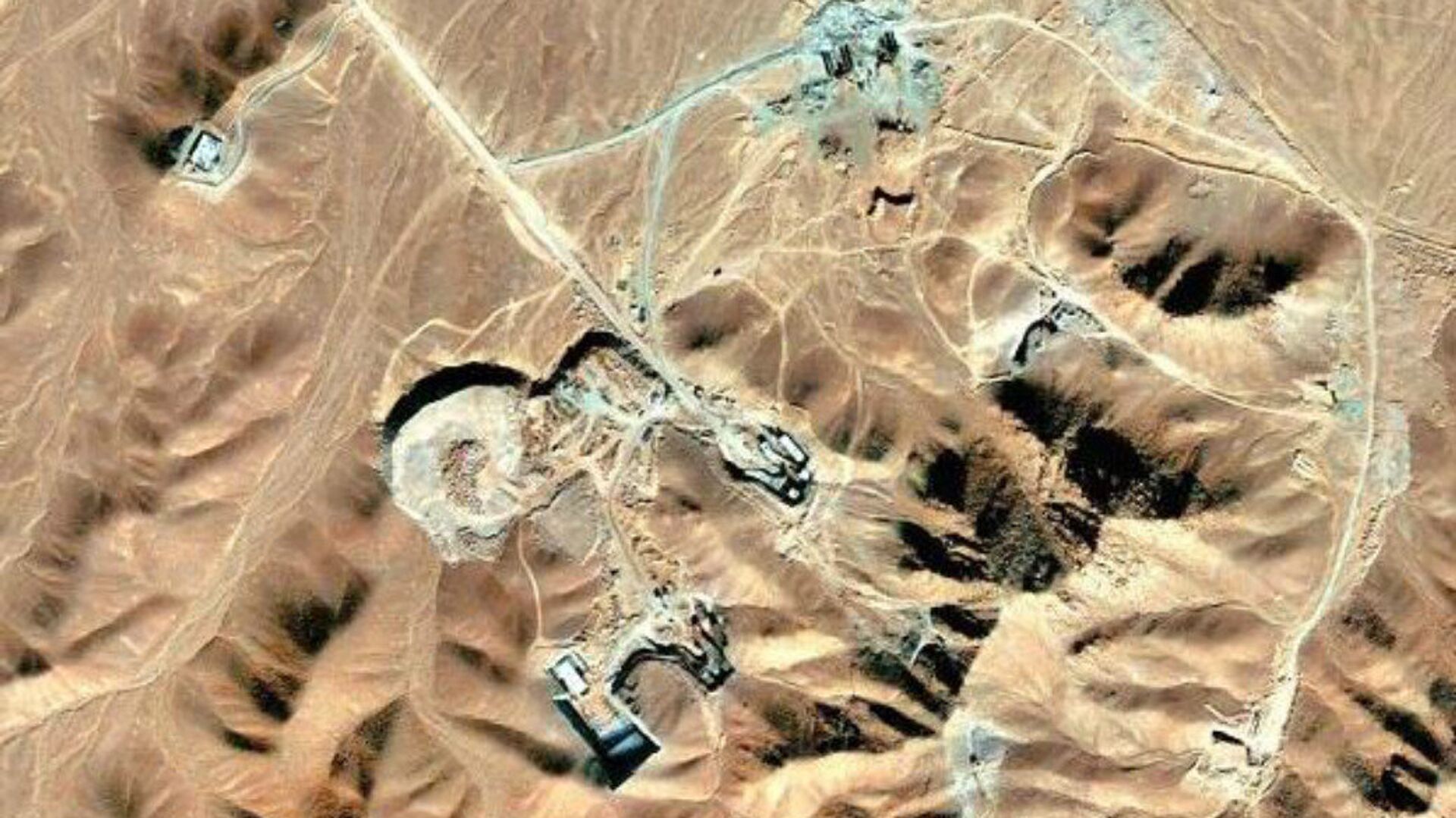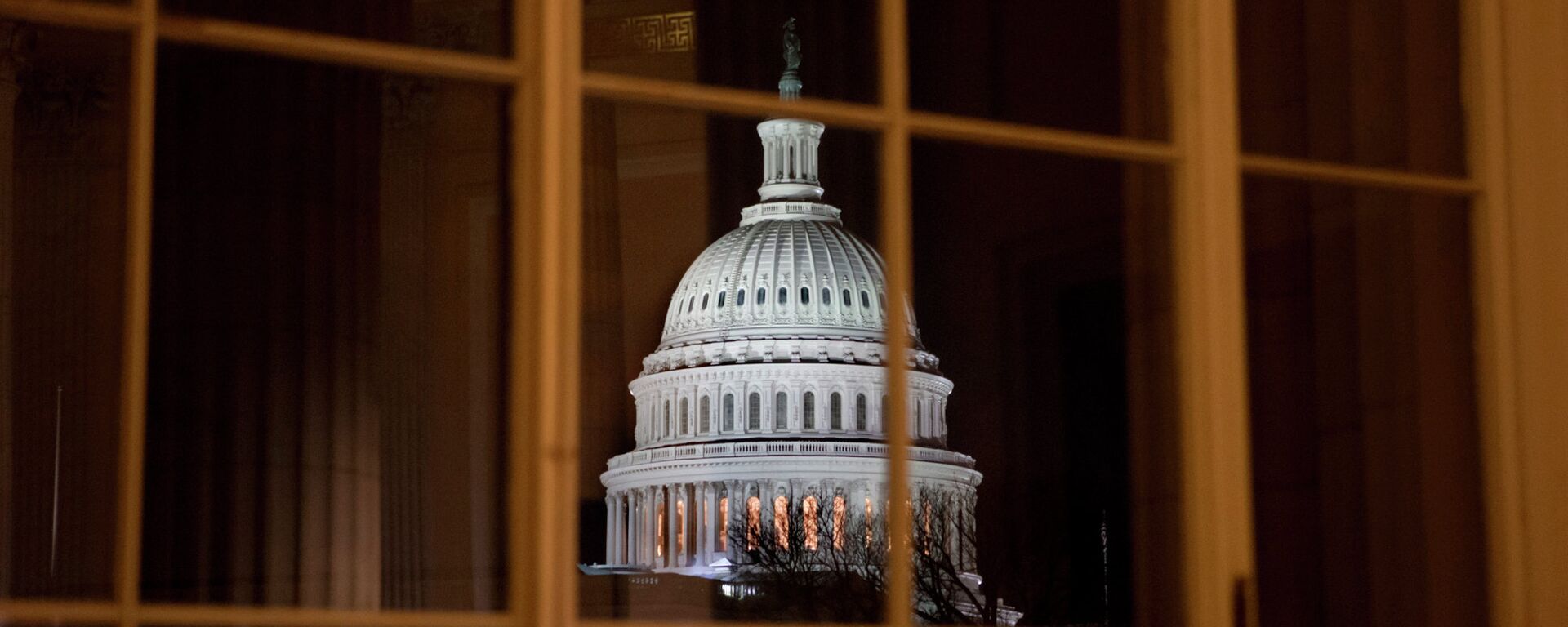https://sputnikglobe.com/20220621/iran-reportedly-readying-for-uranium-enrichment-plant-upgrade-amid-standoff-over-jcpoa-deal-1096505172.html
Iran Reportedly Readying for Uranium Enrichment Plant Upgrade Amid Standoff Over JCPOA Deal
Iran Reportedly Readying for Uranium Enrichment Plant Upgrade Amid Standoff Over JCPOA Deal
Sputnik International
With indirect US-Iran talks on restoring the 2015 Joint Comprehensive Plan of Action (JCPOA) deadlocked, any further escalation in the ongoing political and... 21.06.2022, Sputnik International
2022-06-21T02:48+0000
2022-06-21T02:48+0000
2024-06-08T11:31+0000
iran
us-iran relations
nuclear talks
uranium enrichment
iran nuclear deal
nuclear reactor
https://cdn1.img.sputnikglobe.com/img/104474/56/1044745650_0:90:1043:676_1920x0_80_0_0_9b75594f7f2bca911d90ff9eecbef8e6.jpg
Iran is ramping up its uranium enrichment by preparing to employ upgraded IR-6 centrifuges at its subterranean Fordow Fuel Enrichment Plant in the central part of the country, which can switch between enrichment stages more readily, Reuters reported on Monday, citing a UN nuclear watchdog report.According to the report, the decision is the latest in a series of moves that Iran has warned of but delayed taking until 30 of the 35 countries on the International Atomic Energy Agency's (IAEA) Board of Governors endorsed a resolution blasting it for allegedly failing to explain uranium traces discovered at undeclared locations earlier this month.The IAEA inspectors reportedly confirmed late last week that Iran was ready to feed uranium hexafluoride (UF6) gas, the material centrifuges enrich, into the second of two cascades, or clusters, of IR-6 centrifuges installed at Fordow. Then, on Monday, Iran reportedly informed the IAEA that passivation of the cascade, which occurs before enrichment and involves pumping UF6 into the machinery, had begun on Sunday.Notably, as Reuters pointed out, the 166-machine cascade is the only one with "modified sub-headers," which makes switching to different purity levels easier. That equipment has long been a source of concern for Western diplomats because it may allow Iran to quickly enrich to greater levels, according to the article. Meanwhile, the JCPOA deal had banned all uranium enrichment activities at Fordow.Iran has also reportedly not informed the agency of the purity to which the cascade will enrich after passivation. The nation previously told the IAEA the two IR-6 cascades might be utilized to enrich to 5% or 20% purity.Iran is already enriching uranium to up to 60% at a different plant, which is well above the 3.67% cap set in the 2015 nuclear deal, and nears the roughly 90% purity of weapons-grade material.In response to the US withdrawal from the deal in 2018 and the reimposition of sanctions, Iran has declared that it would no longer be bound by the terms of the agreement; however, Tehran has repeatedly stated it has no plans to develop nuclear weapons.Iran Is Ready for 'Good Deal' But US Believes It's 'Dead'Meanwhile, also on Monday, Iran's Foreign Ministry spokesperson Saeed Khatibzadeh said at a news conference that Tehran is ready to achieve a "good deal" with international powers, specifically blaming the US for blocking discussions to renew their 2015 nuclear bargain.He further stressed that Iran is not refusing to negotiate and expects reciprocal steps from Washington.However, the Iran nuclear deal is considered to be history, according to senior US congressional leaders from both parties, who instead have blamed the Iranian side for the standoff.Menendez blamed the lack of a "clear path forward" on "conflict inside Iran."In March, the nuclear agreement appeared to be on the verge of being reinstated, but talks were thrown into disarray over whether the US would remove the Islamic Revolutionary Guard Corps (IRGC), which controls elite armed and intelligence forces that Washington accuses of waging a global terrorist campaign, from its list of Foreign Terrorist Organizations (FTOs).
https://sputnikglobe.com/20220620/in-rare-expression-of-bipartisan-unity-us-lawmakers-agree-iran-nuclear-deal-is-dead-1096498861.html
iran
Sputnik International
feedback@sputniknews.com
+74956456601
MIA „Rossiya Segodnya“
2022
News
en_EN
Sputnik International
feedback@sputniknews.com
+74956456601
MIA „Rossiya Segodnya“
Sputnik International
feedback@sputniknews.com
+74956456601
MIA „Rossiya Segodnya“
iran, us-iran relations, nuclear talks, uranium enrichment, iran nuclear deal, nuclear reactor
iran, us-iran relations, nuclear talks, uranium enrichment, iran nuclear deal, nuclear reactor
Iran Reportedly Readying for Uranium Enrichment Plant Upgrade Amid Standoff Over JCPOA Deal
02:48 GMT 21.06.2022 (Updated: 11:31 GMT 08.06.2024) Kirill Kurevlev
Managing Editor
With indirect US-Iran talks on restoring the 2015 Joint Comprehensive Plan of Action (JCPOA) deadlocked, any further escalation in the ongoing political and economic confrontation risks stifling the prospects of providing a stable resolution to Iran's nuclear ambitions and lifting of US sanctions.
Iran is ramping up its uranium enrichment by preparing to employ upgraded IR-6 centrifuges at its subterranean Fordow Fuel Enrichment Plant in the central part of the country, which can switch between enrichment stages more readily, Reuters
reported on Monday, citing a UN nuclear watchdog report.
According to the report, the decision is the latest in a series of moves that Iran has warned of but delayed taking until 30 of the 35 countries on the International Atomic Energy Agency's (IAEA) Board of Governors endorsed a resolution blasting it for allegedly failing to explain uranium traces discovered at undeclared locations earlier this month.
The IAEA inspectors reportedly confirmed late last week that Iran was ready to feed uranium hexafluoride (UF6) gas, the material centrifuges enrich, into the second of two cascades, or clusters, of IR-6 centrifuges installed at Fordow.
Then, on Monday, Iran reportedly informed the IAEA that passivation of the cascade, which occurs before enrichment and involves pumping UF6 into the machinery, had begun on Sunday.
Notably, as Reuters pointed out, the 166-machine cascade is the only one with "modified sub-headers," which makes switching to different purity levels easier. That equipment has long been a source of concern for Western diplomats because it may allow Iran to quickly enrich to greater levels, according to the article.
Meanwhile, the JCPOA deal had banned all uranium enrichment activities at Fordow.
Iran has also reportedly not informed the agency of the purity to which the cascade will enrich after passivation. The nation previously told the IAEA the two IR-6 cascades might be utilized to enrich to 5% or 20% purity.
"The Agency has yet to receive clarification from Iran as to which mode of production it intends to implement for the aforementioned cascade, following the completion of passivation," the report read.
Iran is already enriching uranium to up to 60% at a different plant, which is well above the 3.67% cap set in the 2015 nuclear deal, and nears the roughly 90% purity of
weapons-grade material.In response to the US withdrawal from the deal in 2018 and the reimposition of sanctions, Iran has declared that it would no longer be bound by the terms of the agreement; however, Tehran has repeatedly stated it has no plans to develop nuclear weapons.
Iran Is Ready for 'Good Deal' But US Believes It's 'Dead'
Meanwhile, also on Monday, Iran's Foreign Ministry spokesperson Saeed Khatibzadeh said at a news conference that Tehran is ready to achieve a "good deal" with international powers, specifically blaming the US for blocking discussions to renew their 2015 nuclear bargain.
"Even today, we are ready to return to Vienna to reach a good deal if Washington fulfills its commitments," Khatibzadeh said.
He further stressed that Iran is not refusing to negotiate and expects reciprocal steps from Washington.
However, the Iran nuclear deal is considered to be history, according to senior US congressional leaders from both parties, who instead have blamed the Iranian side for the standoff.
"I’m not optimistic there will be such a deal. The administration believes that strategically it makes sense to keep the offer on the table, but I don’t see the pathway forward. That’s my own view,” Senate Foreign Relations chairman Bob Menendez (D-NJ) said on Monday.
Menendez blamed the lack of a "clear path forward" on "conflict inside Iran."
In March, the nuclear agreement appeared to be on the verge of being reinstated, but talks were thrown into disarray over whether the US would remove the Islamic Revolutionary Guard Corps (IRGC), which controls elite armed and intelligence forces that Washington accuses of waging a global terrorist campaign, from its list of Foreign Terrorist Organizations (FTOs).


